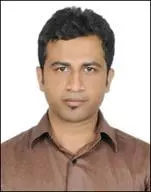Physical examination in patient treatment: Is it fading gradually?

The stethoscope which was once worn proudly by most physicians is hardly seen nowadays. In fact, surgeons have limited the usage of their hands for physical examination and instead are depending on Ultrasound and CT scan reports which may not always be reliable
Bengaluru: The city's doctors say that it is time to rely on physical examination instead of blindly following test reports.
Ever wondered why doctors have reduced the usage of stethoscopes and are relying on ultrasound/CT scan instead of physical examination? Well, the trend can be dangerous, says Dr. Vinod Kumar P, Consultant Urologist and Laparoscopic surgeon at NU Hospitals said.
Several researches recently have shown that there is a significant deterioration in physical examination skills among the modern doctors. Not doing physical examination can hamper patient safety as they can lead to incorrect as well as missed diagnoses, thereby causing delays in timely implementation of treatments.
Dr Vinod says, "The stethoscope which was once worn proudly by most physicians is hardly seen nowadays. In fact, surgeons have limited the usage of their hands for physical examination and instead are depending on Ultrasound and CT scan reports which may not always be reliable. The common reasons for this change in norm are improvements in technology and time constraints. The recent change in peoples' perspective of looking medicine as a 'profitable business' has pushed these doctors to investigate thoroughly to reach the diagnosis. Medico-legal issues creeping up 'now and then' are also making a doctor think twice before putting the pen on the paper. Being an Urologist, I will dwell into two similar instances encountered in my practice."
Citing real life examples, Dr Vinod said, "A middle-aged married woman consulted me with complaints of recurrent urinary tract infection (UTI), mild burning urination with lower abdominal pain for the past couple of years. She was treated by her gynaecologist with different antibiotics every time for about five to seven days but yet the infection restarted. All kinds of tests were done which were all normal. In fact, urine culture done for urine infection was also negative most of the time. Finally, she came to us for an expert opinion. I was surprised that she had not undergone any kind of physical examination even once during her past consultations. I asked my colleague and a gynaecologist to examine who diagnosed her to have PID (pelvic inflammatory disease) after proper examination per speculum. She was treated appropriately and the problem never recurred.
In another instance, a 55-year old male had severe burning urination, pain after passing urine, poor urine flow etc for the past two years. He had met two urologists already who did all kinds of tests and all were normal. He was even advised medicines for prostate problems (as this is the common age for prostate issues) but no improvement observed. He had even stopped taking spicy diet and alcohol as he thought these were the foods causing him burning urination. When he came to me, I just did his physical examination after history. He actually had significant phimosis (tight foreskin of penis) which was the actual cause of his problem. I felt very much disappointed as this was a trivial problem which had created a "mountain out of a molehill". Simple examination could have avoided so much of a patient's worry, anxiety and saved a lot of time be it anybody's. He underwent circumcision (removal of tight foreskin) and is asymptomatic now."
An Ayurvedic physician, Dr Sanath Shetty said, "In this fast moving world and updated technology which make your life easy that somewhere turns simple things into complex and make us forget the basics and reduce the efficiency to use the yukthi of individuals. This takes back to the origin of the medical field which was designed to nurture the patient and make the world healthy. It is likely turned into a best commercially booming field and misleading the public - One such instance is the interaction of doctors and patients and the way of diagnosing the condition to rightly treating it."
He added: 'This art of touch from a Vaidya on to patients can create miracles and can also be the first line of medicine and a ray of hope to many patients who always want to find a person and proudly say that yes, he/she is my doctor.








